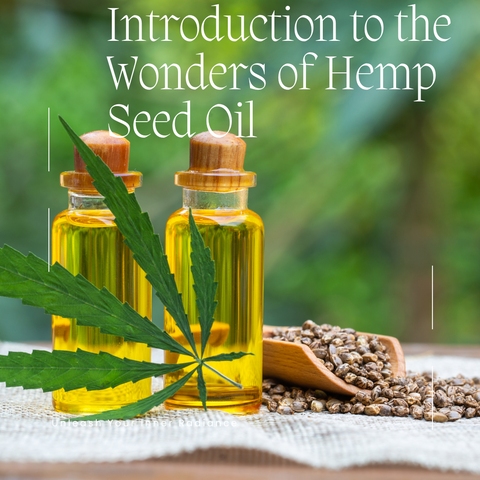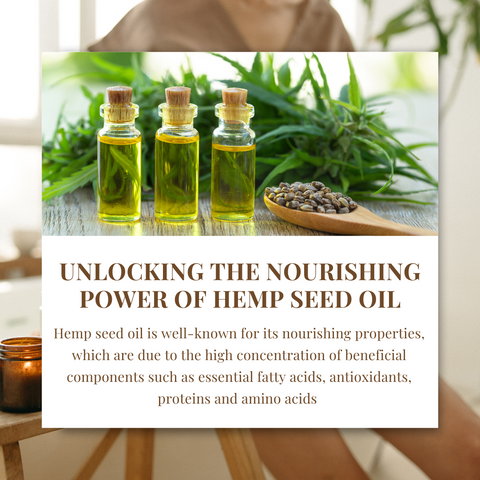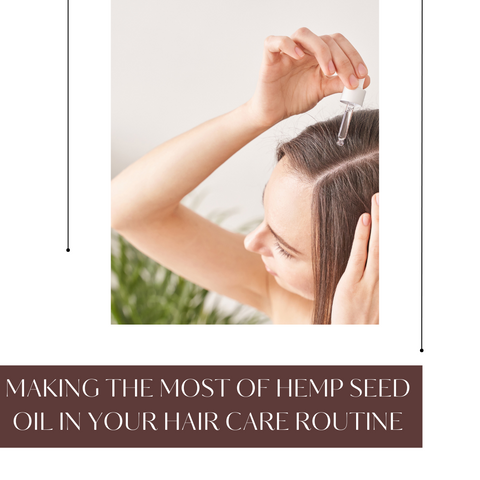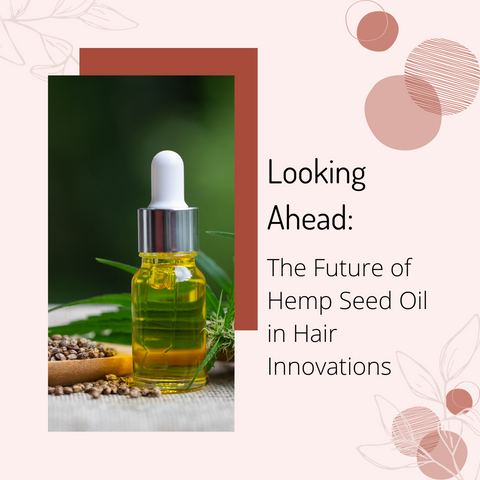Hemp seed oil offers numerous benefits for hair health due to its unique composition and nourishing properties. This blog delves into how hemp seed oil can help with hair health.
Introduction to the Wonders of Hemp Seed Oil

Hemp seed oil, which is extracted from the seeds of the Cannabis sativa plant, has gained popularity due to its numerous health and beauty benefits. Here's a primer on the benefits of hemp seed oil, including its nutrient-rich composition, moisturising, and hydrating characteristics, balancing for different skin types, anti-inflammatory properties, support for skin health, hair nourishment, variety in the application, and non-psychoactive nature. When contemplating hemp seed oil for skincare or hair care, select a high-quality, cold-pressed oil and conduct patch tests, especially if you have sensitive skin or allergies. Incorporating hemp seed oil into your daily regimen can bring a slew of advantages, including healthier skin and hair.
Hemp Seed Oil: The Hair Elixir Nature Bestowed Upon Us
Hemp seed oil is a remarkable elixir for hair, providing a variety of benefits that improve its health and appearance:
-
Moisturization and Hydration: Omega-3 and omega-6 fatty acids in hemp seed oil deeply moisturise and hydrate the hair. It prevents dryness and keeps hair strands soft and manageable.
-
Strengthens Hair: Hemp seed oil contains proteins that fortify hair strands, reducing breakage and promoting stronger, healthier-looking hair. This is especially useful for reducing split ends and hair damage.
-
Scalp Health: Its moisturising properties extend to the scalp, relieving itching and dryness. A well-nourished scalp promotes healthier hair growth and can help with problems like dandruff and flakiness.
-
Adds Shine and Lustre: Hemp seed oil improves the look of hair overall by smoothing the hair cuticle and giving it a natural sheen. This gives hair a glossier, more vibrant appearance.
-
Balances Oil Production: Hemp seed oil, although an oil, has a thin consistency that aids in controlling the amount of oil produced on the scalp. This keeps it lightweight and works well for a variety of hair types, including oily hair.
-
Stimulates Growth: Applying hemp seed oil to the scalp may improve blood circulation, which could help nourish hair follicles. A healthier blood flow can encourage the growth of hair.
-
Nourishment and Antioxidant Protection: Hemp seed oil, which is high in vitamins, minerals, and antioxidants, nourishes hair follicles and protects against environmental damage. This improves the overall health and vitality of the hair.
-
Improves Manageability: The moisturising properties of hemp seed oil make hair more manageable, reducing frizz and tangles. This helps in styling and maintaining smoother, more controllable hair.
You can add hemp seed oil to your hair care regimen in the following ways:
-
As a leave-in treatment, apply a few drops of pure hemp seed oil to the ends of the hair.
-
Look for hemp seed oil as an ingredient in hair care products such as shampoos, conditioners, and masks.
-
For added benefits, combine hemp seed oil with other natural ingredients like honey, yoghurt, or essential oils in DIY hair masks or treatments.
Regular application of hemp seed oil to your hair care routine can result in significant improvements in hair health, shine, and manageability. However, as with any new hair product, a patch test is recommended to ensure compatibility, especially for individuals with sensitive skin or scalp.
The Chemical Composition: Why Hemp Seed Oil is a Hair Game-Changer
The chemical composition of hemp seed oil contains several components that make it a powerful game changer for hair health:
-
Essential Fatty Acids: Hemp seed oil is high in essential fatty acids, particularly omega-3 and omega-6 fatty acids, in an ideal ratio for human health. These fatty acids are essential for healthy hair because they moisturise and strengthen hair strands, reducing breakage and encouraging hair growth.
-
Proteins: Hemp seed oil includes proteins that provide structural support to the hair, assisting in the fortification of hair strands and the prevention of damage. This protein content contributes to hair strength and resilience.
-
Vitamins and Minerals: Hemp seed oil contains vitamins (such as vitamin E) and minerals (such as potassium, magnesium, and calcium) that are beneficial to the scalp and hair follicles. These nutrients help to support healthy hair development and overall hair health.
-
Antioxidants: Hemp seed oil contains antioxidants such as vitamin E and other phytonutrients that protect hair from environmental free radical damage. This protection helps to maintain hair vitality and reduces the effects of oxidative stress on hair strands.
-
Moisturising Agents: Hemp seed oil's fatty acids penetrate the hair shaft deeply, giving significant moisture and hydration. This moisturiser keeps hair silky, smooth, and manageable by preventing dryness.
-
Gamma-Linolenic Acid (GLA): Hemp seed oil contains GLA, which has anti-inflammatory characteristics that can ease scalp issues like dandruff or itching, enabling a healthier scalp environment for improved hair development.
-
Linoleic Acid and Oleic Acid: These fatty acids contribute to the oil's light texture and capacity to balance scalp oil production. Because it regulates sebum production, hemp seed oil is excellent for all hair types and does not cause greasiness.
The balanced combination of these components in hemp seed oil makes it a versatile and efficient hair care ingredient. Regular usage of hemp seed oil can dramatically increase hair hydration, strength, gloss, and general health. To ensure optimum effectiveness and efficacy, search for high-quality, cold-pressed hemp seed oil in hair care products. Incorporating hemp seed oil into your hair care routine, either as a standalone treatment or inside hair care products, can result in visible benefits to hair health and appearance.
A Historical Glimpse: Hemp in Traditional Hair Remedies
Hemp has a long history of being used in traditional hair remedies across various cultures due to its beneficial properties for hair health. Here's an example of its historical application:
-
Ancient Chinese Remedies: Hemp seed oil was used for hair care in traditional Chinese medicine. It was thought to nourish the scalp, strengthen the hair, and improve the texture and lustre of the hair. To promote healthier and more robust hair, hemp-based oils or extracts were employed in a variety of hair treatments.
-
Ayurvedic Practices: Hemp seeds and oils were utilised for hair treatment in Ayurveda, India's traditional medicine system. Hemp was thought to be good for moisturising hair, preventing dryness, and preserving scalp health. It was frequently mixed with other botanical extracts to make hair oils or masks.
-
European Folk Remedies: Hemp was also utilised for hair problems in European folk medicine. To address dryness, itching, and dandruff, hemp oil was administered to the scalp. Its moisturising effects were praised for boosting hair texture and scalp health.
-
Native American Uses: Native American tribes used hemp seeds and oils in a variety of beauty and grooming practises, including hair treatment. Hemp-based treatments were utilised for scalp massage to improve blood circulation and nourish hair follicles, resulting in healthier hair growth.
Throughout history, hemp has been valued for its high concentration of essential fatty acids, proteins, vitamins, and minerals that are beneficial to hair. These traditional therapies used hemp seeds, oils, or extracts to treat a variety of hair conditions, including dryness and scalp disorders, as well as encourage stronger, shinier hair. While these ancient practises continued, scientific understanding and formulation of hair care products advanced. Hemp seed oil is still valued for its possible advantages in modern hair care formulas today. Its inclusion in modern hair care products is due to its nourishing, moisturising, and strengthening characteristics, which help to maintain healthy hair and scalp.
Unlocking the Nourishing Power of Hemp Seed Oil

Hemp seed oil is well-known for its nourishing properties, which are due to the high concentration of beneficial components such as essential fatty acids, antioxidants, proteins and amino acids, vitamins and minerals, balancing properties, anti-inflammatory benefits, barrier support, gentle exfoliation, and renewal. Hemp seed oil deeply nourishes and moisturises the skin when applied topically, making it a popular ingredient in skincare products such as moisturisers, serums, and cleansers. Its adaptability and rich nutrient profile promote healthier-looking skin while addressing a variety of skin issues. It is important to note, however, that individual skin reactions can vary. Before using new hemp seed oil-containing skincare products, conduct a patch test, especially if you have sensitive skin or allergies.
Hydration and Shine: How Hemp Seed Oil Transforms Hair
Hemp seed oil is a versatile ingredient that can transform hair by providing hydration, nourishment, and shine via a variety of mechanisms, including:
-
Deep Moisturization: Hemp seed oil includes omega-3 and omega-6 fatty acids, which penetrate the hair shaft and moisturise and hydrate it from within. This helps to keep hair silky, smooth, and manageable by preventing dryness.
-
Strengthens Hair: Hemp seed oil's proteins strengthen hair strands, preventing breakage and broken ends. This strengthens the hair, making it more resistant to injury.
-
Scalp Health: Applying hemp seed oil to the scalp might help relieve itching and dryness. A healthy scalp environment promotes healthy hair development and minimises dandruff.
-
Adds Shine and Luster: Hemp seed oil smoothes the hair cuticle, adding natural shine and improving the overall appearance of the hair. This adds lustre to the hair and helps it appear healthier.
-
Balances Oil Production: Despite the fact that it is an oil, hemp seed oil has a light texture that aids in the regulation of oil production on the scalp. It regulates sebum production, making it suited for all hair types while leaving no greasy residue.
-
Stimulates Growth: Massage hemp seed oil into the scalp to improve blood circulation and nutrition delivery to hair follicles. Better blood flow can promote healthier hair growth.
-
Nourishment and Antioxidant Protection: Hemp seed oil, which is high in vitamins, minerals, and antioxidants, nourishes the scalp and protects hair from environmental harm. This can help to keep hair vibrant and prevent the effects of oxidative stress on hair strands.
-
Improved Manageability: The moisturising properties of hemp seed oil make hair more manageable, reducing frizz and tangles. This helps with smoother styling and overall hair control.
Tackling Damage: Hemp Seed Oil’s Role in Hair Repair
Because of its nourishing and strengthening capabilities, such as moisturization and hydration, strengthening hair structure, scalp health, protective barrier, nutrient delivery, minimises frizz and split ends, and improving hair texture, hemp seed oil plays an important role in restoring damaged hair. Incorporating hemp seed oil into your hair care routine, either as a solo therapy or through hair care products containing this beneficial oil, will help restore damaged hair dramatically. However, consistent use over time is required to see significant improvements in hair restoration and overall hair health. As with any new hair product, conduct a patch test before full application, especially if you have sensitive skin or a sensitive scalp. Additionally, for severe hair damage or specific concerns, consult a dermatologist or hair care professional for personalised recommendations.
The Scalp Rejuvenation: Hemp Seed Oil's Calming and Healing Properties
Hemp seed oil has calming and healing properties, making it useful for scalp rejuvenation and addressing a variety of scalp issues:
-
Hemp seed oil is rich in fatty acids, especially omega-3 and omega-6, which deeply moisturise the scalp. This helps alleviate dryness and soothes irritated or itchy scalp conditions, providing relief and comfort.
-
The anti-inflammatory effects of hemp seed oil are attributed to certain compounds, such as gamma-linolenic acid (GLA). These qualities can aid in reducing irritation to the scalp brought on by specific hair products or conditions like psoriasis and eczema.
-
To balance oil production on the scalp, hemp seed oil can be used because of its lightweight consistency, even though it is an oil. It is therefore appropriate for people with oily scalps since it controls sebum production without making the skin overly oily.
-
Hemp seed oil provides the scalp with nourishment and antioxidant protection by containing vitamins, minerals, and antioxidants that shield the scalp from environmental harm. This can assist in preserving the health of the scalp and avert oxidative stress, which may exacerbate scalp problems.
-
Hemp seed oil promotes healthy hair growth by creating a healthier scalp environment. Hair follicle health is promoted by a nourished scalp with improved blood circulation, potentially leading to stronger and healthier hair.
-
Hemp seed oil's calming and moisturising qualities have the ability to reduce irritation on the scalp that can be brought on by a variety of conditions, such as allergies, dryness, or sensitivity to specific hair care products.
-
Hemp seed oil may provide light exfoliation and cleansing in certain situations, assisting in the removal of dead skin cells from the scalp. This mild cleaning action helps to maintain the health of the scalp by preventing buildup that could lead to problems like dandruff.
To take advantage of the scalp-rejuvenating benefits of hemp seed oil:
-
Before shampooing, apply a tiny amount of pure hemp seed oil to the scalp and gently massage it in circular motions. This has the potential to calm and moisturise the scalp.
-
Look for hemp seed oil in hair care products such as shampoos or scalp treatments that are specifically formulated for scalp health.
Consult a dermatologist or healthcare professional for proper diagnosis and personalised advice on incorporating hemp seed oil or related products into your scalp care routine if you have chronic scalp conditions or persistent issues.
Making the Most of Hemp Seed Oil in Your Hair Care Routine

Incorporating hemp seed oil into your hair care routine can provide numerous benefits. Here are some ways to use hemp seed oil to get healthier hair:
-
Pure Application: Use pure hemp seed oil as a leave-in treatment. Apply a few drops to your fingertips and massage into damp or dry hair ends to add moisture, smoothness, and shine.
-
Choose Hemp-Infused Hair Products: Look for shampoos, conditioners, hair masks, or serums that contain hemp seed oil as a key ingredient. These products can supplement your regular hair care routine by providing the benefits of hemp seed oil.
-
DIY Hair Masks or Treatments: Use hemp seed oil as a base ingredient to make DIY hair masks or treatments. Combine it with other natural ingredients known for their beneficial properties, such as honey, avocado, yoghurt, or essential oils, to create customised treatments for your hair.
-
Pre-shampoo Scalp Massage: Apply hemp seed oil to your scalp and gently massage it before shampooing. This can help moisturise and soothe the scalp, relieving dryness and irritation.
-
Overnight Treatment: Apply hemp seed oil generously to your hair and scalp for an intensive hair treatment, then cover with a shower cap or wrap in a towel overnight. In the morning, rinse it out to reveal deeply nourished and conditioned hair.
-
Protective Styling: Before using heat on your hair, lightly coat it with hemp seed oil. This can lessen the chance of heat damage while acting as a heat protectant and giving the hair more shine.
-
Consistency is Key: Incorporate hemp seed oil into your routine on a regular basis to see significant improvements in hair texture, moisture, and overall health.
Before using hemp seed oil or products containing it extensively, remember to perform a patch test, especially if you have sensitive skin or a sensitive scalp. This will help to ensure that you have no negative effects. Individuals with specific scalp or hair conditions should visit a hairstylist or dermatologist for personalised instructions on how to use hemp seed oil in their hair care routine for maximum results.
Choosing the Right Hemp-Infused Hair Products
Choosing the best hemp-infused hair products requires taking into account your individual hair needs, preferences, and product quality. Here's how to pick the best hemp-infused hair care products:
-
Determine Your Primary Hair Concerns: Identify your primary hair concerns, such as dryness, damage, frizz, or scalp issues. Look for hemp-infused products that are designed to address these specific issues.
-
Examine the labels and ingredients: Examine the ingredients list for hemp seed oil or hemp extract. Make it a significant inclusion rather than a minor one.
-
Consider the following formulations: Choose products that are designed for your specific hair type (dry, oily, curly, fine, etc.) and concerns. For example, a moisturising hemp shampoo may be appropriate for dry hair, whereas a volumizing hemp conditioner may be appropriate for fine hair.
-
Product Reputation and Reviews: Research and read customer reviews to determine the effectiveness and suitability of the product. Look for products from reputable brands that are known for their formulation quality and transparency.
-
Free of Potentially Harmful Ingredients: Determine whether the product is free of potentially harmful ingredients such as sulphates, parabens, silicones, and artificial fragrances, especially if you prefer cleaner formulations or have sensitivities.
-
Hair Styling Needs: If you are looking for hemp-infused styling products, such as hair serums, oils, or leave-in conditioners, consider their intended purpose and how they align with your styling preferences.
-
Trial Sizes or Samples: If trial sizes or samples are available, use them to test the product before making a full-size purchase. This allows you to evaluate how well the product works for your hair without having to invest in a larger quantity at first.
-
Price and Value: Compare prices while taking into account the product's value in terms of benefits, quality, and size. Higher-priced products may contain higher concentrations of hemp seed oil or other beneficial ingredients.
-
Certifications and Transparency: Look for items that have certifications or clear labelling indicating the origin and quality of the hemp seed oil utilised. Higher-quality hemp seed oil may be organic or cold-pressed.
Keep in mind that everyone's hair reacts differently, so what works for one person may not work for you. Patience and consistency are essential when experimenting with different hair products to see their full effects on your hair. If you have specific scalp difficulties or recurrent issues, a dermatologist or hair care professional can provide tailored advice on the best hemp-infused hair products for you.
The Do’s and Don’ts: Tips for Applying Hemp Seed Oil
Here are some important things to remember when applying hemp seed oil to your hair or skin:
Do's:
-
Perform a Patch Test: Before using hemp seed oil extensively, always perform a patch test, especially if you have sensitive skin or a sensitive scalp. Apply a small amount to a hidden area and wait 24 hours to see if any adverse reactions occur.
-
Use High-Quality Oil: Choose pure, cold-pressed hemp seed oil from a reputable source. High-quality oil ensures greater efficacy with fewer contaminants or additives.
-
Apply to Damp Hair or Skin: Apply hemp seed oil to slightly damp hair or skin for better absorption. This aids in the retention of moisture and allows the oil to spread more easily.
-
Start with Small Amounts: When applying hemp seed oil directly to hair or skin, start with a small amount and gradually increase if necessary. A little goes a long way, and too much can cause greasiness.
-
Massage gently: When applying the oil to the scalp or hair, massage it in circular motions. This improves blood circulation and absorption while minimising friction.
-
Leave-In Treatment: Consider using hemp seed oil as a leave-in conditioner for hair ends or dry skin patches. A small amount applied and left on can provide continuous moisturization.
-
Include in Your Routine: Consistency is Essential. Incorporate hemp seed oil into your regular hair care or skincare routine to reap the full benefits over time.
Don'ts:
-
Overuse: Avoid using too much hemp seed oil, especially on your hair, as it can weigh it down and make it look greasy.
-
Apply Straight Away: Hemp seed oil is generally safe to apply straight away, but in order to prevent skin irritation, it is advised to dilute essential oils or highly concentrated oils first.
-
Use if Allergic: Do not use hemp seed oil without first speaking with a healthcare provider if you have an allergy to hemp or cannabis-related products.
-
Apply Before Heat Styling: Steer clear of applying hemp seed oil right before using heated styling tools on hair because the high heat could burn the oil or make the heat on the hair strands more intense.
-
Use on Open Wounds or Broken Skin: Before using hemp seed oil on areas with active infections, open wounds, or broken skin, get medical advice.
You can optimise the advantages of hemp seed oil while guaranteeing a secure and efficient application on your skin or hair by adhering to these dos and don'ts. Based on the unique requirements and reactions of your skin or hair, modify the usage.
The Long-Term Rewards: What Regular Use Can Achieve
There are various long-term benefits for your hair health when using hemp seed oil regularly in your hair care regimen:
-
Increased Moisture Retention: The hair is deeply hydrated and moisturised by hemp seed oil, which helps to hold onto moisture over time. Regular use can make hair softer, easier to manage, and less frizzy and dry.
-
Enhanced Hair Strength: Hemp seed oil's proteins and fatty acids strengthen hair strands, minimising breaking and brittleness. Long-term use may result in stronger, less prone to damage hair.
-
Scalp Health: Hemp seed oil can help maintain scalp health by addressing dryness, irritation, and flakiness. A healthy scalp environment promotes greater hair development and, over time, decreases concerns such as dandruff.
-
Shinier and Healthier Appearance: Hemp seed oil improves the overall appearance of hair by smoothing the cuticle of the hair. Hair can appear shinier, more vibrant, and healthier with regular use.
-
Reduced Split Ends: Hemp seed oil used regularly can help seal and prevent split ends. This can improve the general state of the hair by reducing split ends and hair damage.
-
Balanced Oil Production: Hemp seed oil contributes to a scalp's balanced oil production. Frequent use helps control sebum production, which benefits oily and dry scalps without being overly greasy.
-
Encourages Healthy Growth: Stronger hair strands and a well-nourished scalp provide the best conditions for healthy hair growth. You might see less hair loss and increased hair growth with regular use.
-
Environmental Damage Protection: Hemp seed oil's antioxidants shield hair from free radicals and environmental stressors. With time, this defence might result in less harm from outside sources like pollution and UV radiation.
To reap these long-term advantages from hemp seed oil, you must be consistent in incorporating it into your hair care regimen. Hemp seed oil can help to improve the overall health and appearance of hair, though individual results may differ depending on hair type and condition.
Looking Ahead: The Future of Hemp Seed Oil in Hair Innovations

The future of hemp seed oil in hair advancement seems bright, given its many benefits and increasing popularity in the wellness and beauty sectors. Advanced formulations, customised hair care solutions, integration of sustainable practises, expansion into mainstream hair care, innovative hair treatments, clinical research and efficacy studies, collaborations and product diversity, consumer education, and awareness are examples of potential advancements and trends. The potential for hemp seed oil in hair care innovations is anticipated to grow as hemp-derived product regulations evolve and scientific knowledge expands. Its adaptability, natural qualities, and possible hair health advantages make it a desirable element in future hair care developments.
































